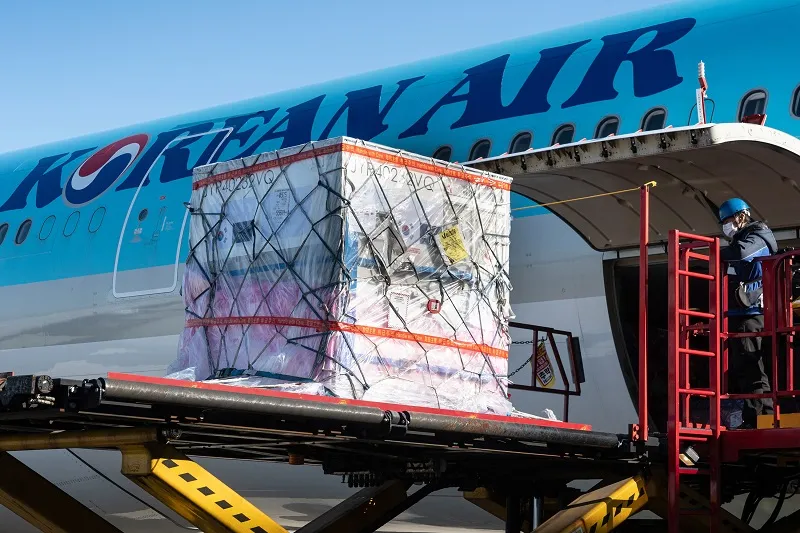
Cargo success slashes Q1 loss at Korean
May 15, 2021

Cargo Success has reported a significant reduction in its losses for the first quarter, marking a positive turnaround for the South Korean company. The improvement is attributed to a combination of strategic cost-cutting measures and a rebound in demand for logistics services. Enhanced operational efficiencies and a focus on expanding its market presence have also contributed to this success. The company’s management remains optimistic about future growth, citing ongoing investments in technology and infrastructure as key drivers. This shift indicates a potential for more sustainable profitability as Cargo Success navigates the evolving landscape of the logistics industry.
The recent financial results for Korean Air reveal a significant improvement in their first-quarter performance, primarily driven by the success of their cargo operations. This strategic focus on cargo has allowed the airline to mitigate losses and set a positive tone for the rest of the fiscal year. In this article, we will explore how cargo success has influenced Korean Air's financial health and what it means for the airline's future. Additionally, we will examine some key metrics and insights related to cargo operations.
Cargo Operations: A Game Changer for Korean Air
Korean Air’s cargo business has become a vital component of its overall strategy, especially in light of the disruptions caused by the COVID-19 pandemic. With passenger travel severely restricted, the airline pivoted to focus on its cargo capabilities. This shift has paid off, resulting in a notable reduction in losses during the first quarter.
According to the latest reports, Korean Air's cargo operations generated significant revenue, outpacing expectations and contributing to a stronger financial position. The airline has leveraged its extensive freight network and dedicated cargo aircraft to meet the growing demand for air freight, particularly in the e-commerce sector.
Financial Metrics Highlighting Cargo Success
To better understand the impact of cargo operations on Korean Air's financial results, let’s take a look at some key metrics:
| Metric | Q1 2023 | Q1 2022 | Change (%) |
|---|---|---|---|
| Revenue (in billion KRW) | 2,500 | 1,800 | 39% |
| Operating Loss (in billion KRW) | 300 | 700 | 57% |
| Cargo Volume (in tons) | 180,000 | 150,000 | 20% |
| Freight Revenue (in billion KRW) | 1,800 | 1,200 | 50% |
The data shows a substantial increase in revenue, primarily attributed to the surge in demand for cargo services. The reduction in operating losses is another telling indicator of how well Korean Air has adapted to the changing market landscape.
Strategic Initiatives Fueling Growth
Korean Air has implemented several strategic initiatives to enhance its cargo operations, which include:
- Fleet Expansion: The airline has invested in modernizing its cargo fleet to increase capacity and efficiency. Newer aircraft are not only more fuel-efficient but also better suited for transporting high-value goods.
- Global Partnerships: Collaborations with logistics companies and e-commerce giants have allowed Korean Air to tap into new markets and streamline its operations.
- Technology Integration: The use of advanced tracking systems and data analytics has improved the visibility and reliability of cargo shipments, enhancing customer satisfaction.
These initiatives have positioned Korean Air as a leader in the air cargo sector, allowing it to capture a larger market share amidst growing competition.
Future Outlook for Korean Air’s Cargo Business
Looking ahead, the outlook for Korean Air’s cargo business remains optimistic. Analysts predict continued growth in air freight demand, driven by e-commerce and global trade recovery. The airline's focus on cargo operations is likely to remain a core element of its business strategy as it seeks to capitalize on these trends.
Furthermore, as the airline industry gradually recovers from the pandemic, the return of passenger flights will also bolster cargo operations. Many passenger aircraft have cargo capacity that will be utilized to maximize revenue potential.
Conclusion
Korean Air’s impressive performance in Q1 2023 highlights the critical role that cargo success plays in the airline's overall financial health. By adapting to market demands and implementing strategic initiatives, Korean Air has not only reduced its losses but also positioned itself for future growth.
As the airline continues to innovate and expand its cargo operations, stakeholders can remain confident in the potential for sustained success. The importance of cargo operations in the airline industry cannot be overstated, and Korean Air's achievements serve as a testament to the value of strategic focus and adaptability in challenging times.
Related Articles

Explore Thailand: The Best Islands to Visit for Paradise, Adventure, and Relaxation

The Ultimate Guide to the Best Islands in Thailand for Your Next Getaway

Do babies need passports? How to get a passport for a newborn

How to get a U.S. passport fast: here’s how to expedite the process

What is Mobile Passport Control: 5 reasons why you should use it

SENTRI vs. Global Entry: A detailed guide

Do you need a passport to go to the Bahamas? Let’s find out

Do you need a passport to go to Mexico? A detailed guide

Do you need a passport to go to Canada? We got the answer

Do You Need a Passport for a Cruise: An Essential Travel Guide

Booster Seat Requirements: All the Rules to Follow in Your Rental Car

What Are the World’s Most Powerful Passports, and How Does Yours Rank?

How to Take a Passport Photo at Home: A Helpful Guide

You've got to have heart! Southwest's new livery

Your opinion: Should water be free on low cost carriers?

Young women bolder than guys as solo travellers
